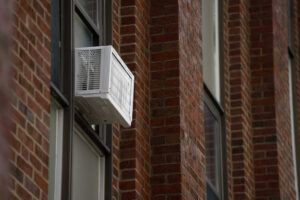by The Cowl Editor on September 13, 2018
Campus

by Alyssa Cohen ’21
Opinion Staff
It is difficult to walk around Providence College at any time of year without spotting a few tired eyes and wide array of coffee cups. College tends to be a common time for students to be a bit sleep deprived.
However, there have been more expressions of sheer exhaustion on the faces of PC students over the past two weeks, even compared to finals week.
Although sleep deprivation poses a major threat to the physical and emotional health as well as the academic performance of PC students, there is a potential solution.
The chronic exhaustion of these students can be easily remedied by the simple installation of air conditioning in traditional dormitory buildings.
As we were experiencing a heat wave over the course of New Student Orientation and throughout the first week of classes, with temperatures reaching the mid-90s during the day and only dropping to the high 70s after dark, students residing in traditional dormitories endured several sleepless nights.
Students living in residence halls without air conditioning began comparing their dormitories to saunas.
To that end, for most students residing in these sweltering dormitories, even attempting to sleep has become an arduous endeavor.
Tess Varley ‘22, a resident of Raymond Hall explained, “None of us have even attempted sleeping under our comforters yet and we’re already over two weeks into the school year.”
Other students have abandoned hope of sleeping in their rooms altogether and have resorted to spending nights on the floors of their friend’s air-conditioned suites or apartments, as well as on the couches in the Slavin Center.
Now is the time for Residence Life to improve living conditions for the hundreds of students residing in traditional dormitories by installing air conditioning units in these buildings.
We simply cannot continue to allow our students to remain so uncomfortable in their rooms that they must spend their nights in the air-conditioned academic buildings, in order to catch a few hours of sleep.
Additionally, the intense heat these students are enduring in their residence halls poses a major threat to their emotional health and ability to adjust to college life.
As the majority of students residing in traditional residence halls are freshmen, sleep deprivation due to the temperature of their buildings may interfere with their abilities to adapt and cope with new situations, making their overall acclimation to campus life exceedingly more difficult.
“Having no air conditioning in the room is difficult as we transition into the school,” shares Emma Lowrey ‘22 of Raymond Hall. “Not only do we have to deal with the stress of meeting new people and starting classes, but we also have to deal with the intense heat, which is affecting us physically and emotionally.”
As sleep is a critical factor in cognitive functioning, sleep loss will inevitably hurt our students’ academic performances.
Essentially, the absence of air conditioning in traditional dormitories has proven detrimental to our student body, and it is the obligation of our institution to invest in some form of temperature control for these buildings.
Perhaps, we could begin to raise the funds for air conditioning in traditional residence halls by encouraging our donors to invest in the welfare of the student body rather than in buildings and structures constructed exclusively for aesthetic appeal.
That way, we can ensure a more comfortable living environment for every PC student.